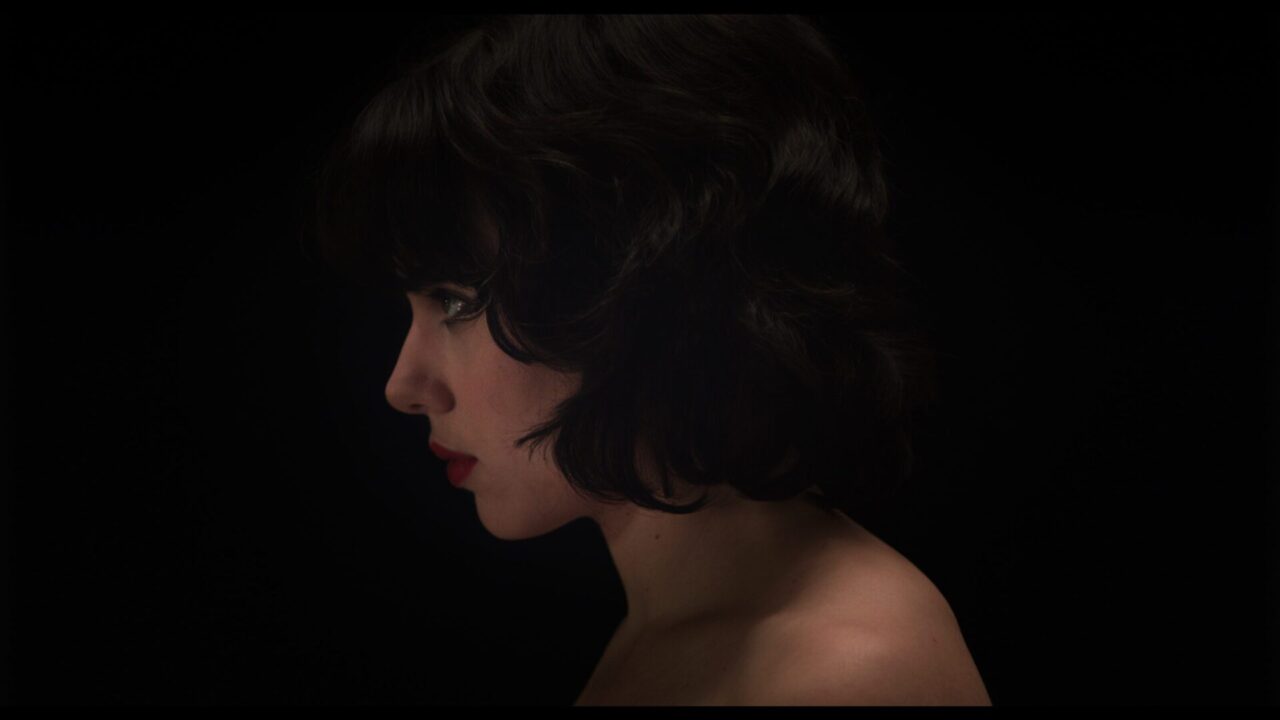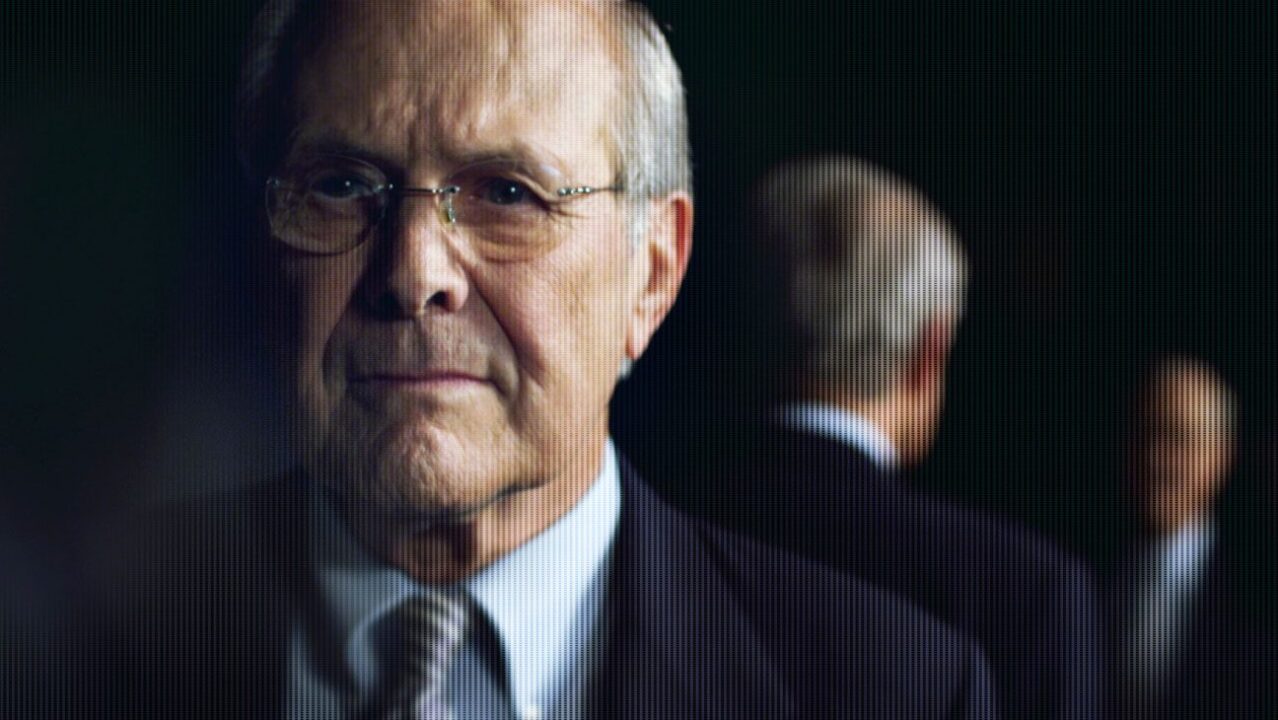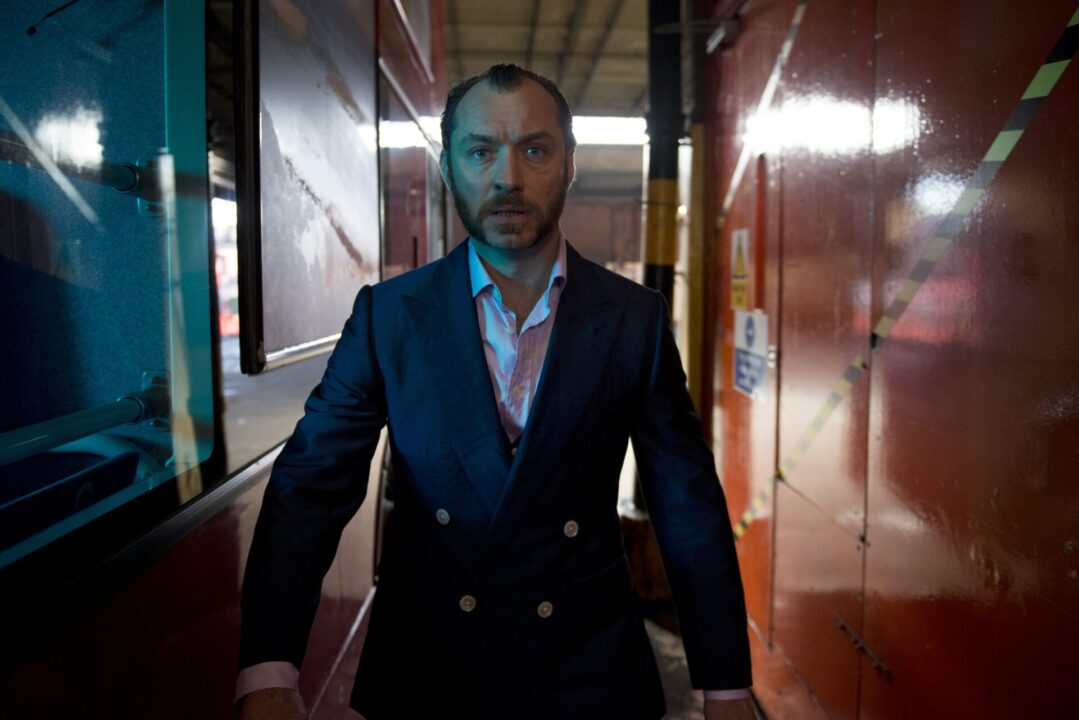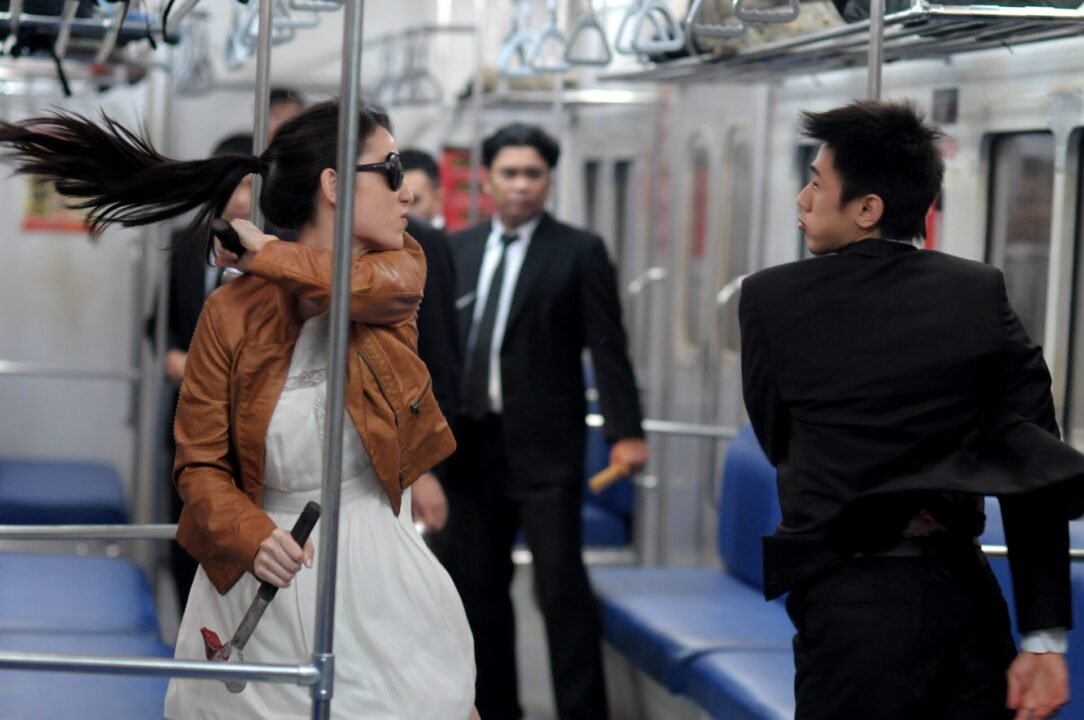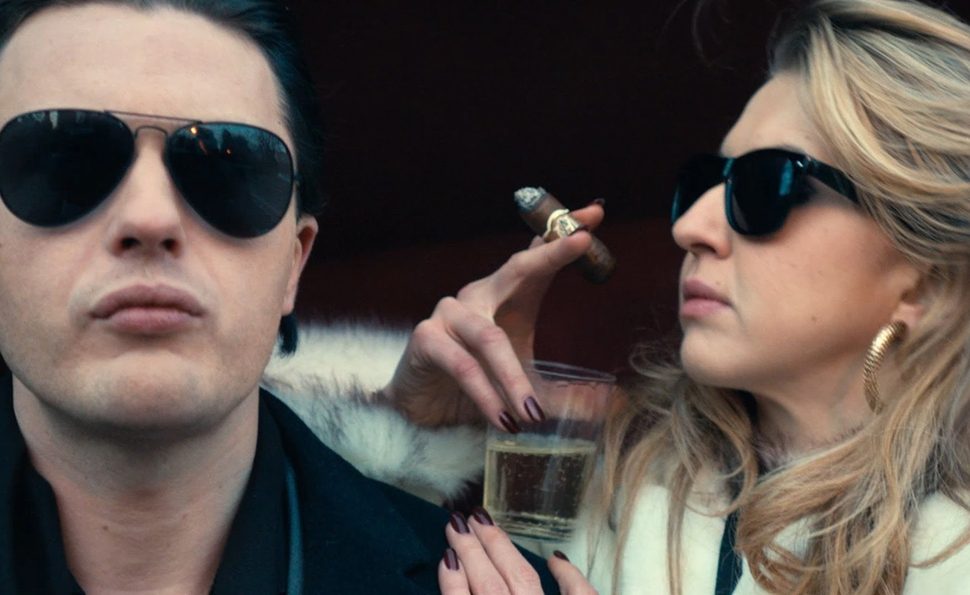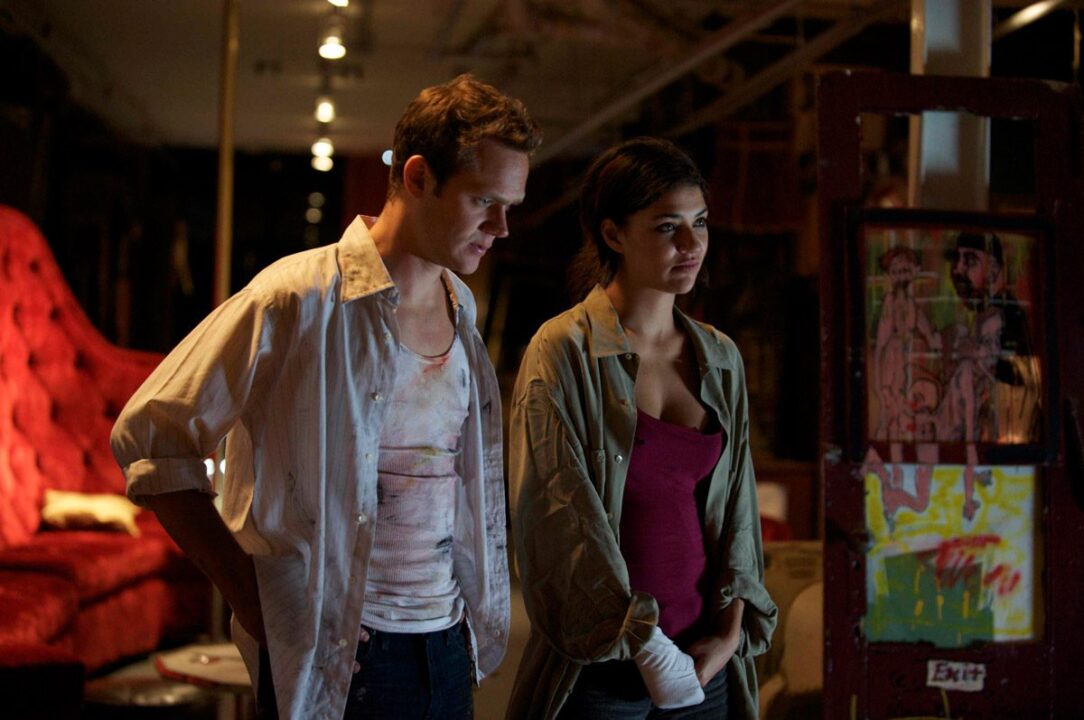Review: 'Under the Skin'
There's a whole lot to love in director Jonathan Glazer's latest sci-fi/art film, Under the Skin. If you're a cinephile who loves raving about the brilliance of Stanley Kubrick and David Lynch, or enjoy seeing Scarlett Johannson grace the big screen (and baring all), and certainly all three, then this movie will provide you with plenty of cinematic nourishment to at least convince you that beautiful and daring films are still being made.
Glazer, a former music video director for bands like Radiohead and feature film director, including 2004's Birth starring Nicole Kidman, channels the aforementioned old masters in creating a darkly hypnotic meditation on the mundaneness and strangeness of the human condition. With aliens (or some "other" being). Photographically, compositionally, visually, the film is some of the most inspired and impressively shot frames of film that have been projected in years.
In terms of the film's story, however; it's going to take a motivated inner cine-spirit to keep your enthusiasm high throughout the film's runtime. Although viewers shouldn't dismiss the film's long spurts of silence- there's a whole lot of it, including the film's fantastic opening sequence, which moves into a Kubrick-ian stage-setting of Johansson's mystery and unnamed character clothing up (like Schwarzenegger's Terminator)- the film wishes itself against any semblance of a more accessible narrative storytelling and pacing. And so what we have here is a patiently moving, slowly creeping movie featuring an incredibly photographed yet largely mute Johansson.
Johansson here gives an incredibly restrained and erotically charged performance, and this role should further establish herself as a serious actor.
Without giving too much away, Under the Skin's story has much to do with just what exactly is under Johansson's mystery character- kind of. On a literal level, we know something is awry and not right with the leading lady, having just witnessed her newly transplanted self-roaming silently and curiously around the public spaces of Scotland (where the movie takes place). Johansson here gives an incredibly restrained and erotically charged performance, and this role should further establish herself as a serious actor. Although seeing the starlet, in a cropped black wig and piercing red lips, channels instant sex appeal, Glazer has his way with adding to it a touch of strangeness that denies an unrestricted lust onto her, even in scenes of seeing her in complete shadowy undress. Although that cinematic reading isn't available to the also unnamed and unsuspecting Scottish male victims in the movie, whom Johannson's character (can I start calling her The Woman?, Apologies to Glazer if this breaks any artistic meaning) drives alongside and brings back to her black-hole chamber of a flat, evoking the dream-like surrealism of an Eraserhead-era Lynch.
And so the story goes: The Woman experiences unfamiliar human events, watching the daily commuters shuffle along the streets, watching human interactions of a family at the beach and young people at the night club, and all the while, continuing to pick up the innocent yet lust-worthy males (IMDB's trivia page states that the men were not real actors, filmed with hidden cameras and only informed they were in a movie afterwards) that keep getting taken back to her spider's web of a flat. The film moves steadily, but these scenes envelope onto themselves constantly to convey the repetitions that Glazer shows as the low-brain activity Woman might experience them.
But- if you are eager and willing to dive deeper into this wildly imagined ride, there are also much deeper thematic takeaways on display. Just like under The Woman's skin, things aren't always as they appear to be. This theme extends from the (possible) literal example of The Woman, but more so about the metaphorical associations and acceptances that a modern-day society recognizes. A beautiful rose pricks the hand with its hidden thorns, and a delicious looking chocolate cake elicits a gag from The Woman. However subtle and artful, it should be acknowledged that Glazer is confronting these issues while lensing a strangely erotic and exotic world female. Don't expect to forget about this film after viewing either; Under the Skin will haunt you for days. Don't say we didn't warn you.
https://www.youtube.com/watch?v=NoSWbyvdhHw
Review: 'The Unknown Known'
Donald Rumsfeld is no movie star. Which is not to say that he is not a celebrity, in his own right.
The famous (or infamous, as this just left of center documentary might appropriate), former secretary of defense under the W. Bush presidency, is no longer in the political spotlight, which, after watching The Unknown Known, could be gathered as something valued very greatly by the documentary's star subject. As time has progressed since the Bush presidency and its proclaimed War on Terror, actuality has seemed to distance itself from history. The Iraq Wars, of which Mr. Rumsfeld acted as the principal architect of, becomes a hazier image to recount, and its particulars have likewise blurred as the story becomes buried ever so quietly amidst today's 24-hour breaking news cycle. Which is why a documentary featuring a singular Rumsfeld, plopped in front of a vast and infinitely black backdrop to disclose to us for the first time, his political career and the controversial stories that were a part of it, would make for not only an entertaining experience but a truly informative and revealing one.
This kind of happens.
Director Errol Morris plays the interviewer himself (though not on camera) to his comfortably sitting subject, to explain to us The Unknown Knowns of his political career. If the title is slightly confusing, the documentary does a good job of defining it periodically. Ever the rational and composed man (to an eerie degree), Rumsfeld explains that (in politics) there are Known Knowns ("That is to say, we know things that we know"), Unknown Unknowns ("That is to say, there are things we don't know we don't know), and Unknown Knowns (...Ok the logic still fails me on this one..."That is to say, there are things we think we know that we don't"). Morris has stated that after meeting and talking to Mr. Rumsfeld, that he knows less about him and the Iraq War then he did before. It's not hard to sympathize with his sentiment, as the documentary, while engaging and notable for its attempts and small successes at curtain-pulling, plays like the story that Rumsfeld might have wanted you to hear, instead of Morris.
Part of Rumsfeld's insight and foresight as a calculative (or perhaps just organized) political figure was that he even kept these detailed snowflakes of his political action, perhaps to remind himself, perhaps to put on record his own version of history, or perhaps to create the world's strangest diary.
Morris sidesteps the conventional question and answer interview style by instead putting Rumsfeld in the hot seat, having him explain his "snowflakes"- the individually unique and enormous archive of typed letters, audio recordings, and other memos that he personally wrote/recorded during his almost fifty years in Congress, the White House, in business, and at the Pentagon. Part of Rumsfeld's insight and foresight as a calculative (or perhaps just organized) political figure was that he even kept these detailed snowflakes of his political action, perhaps to remind himself, perhaps to put on record his own version of history, or perhaps to create the world's strangest diary. With the actual date and time stamped accounts, Morris has Rumsfeld read and explain (not all of them- there are tens of thousands packed away in cardboard boxes. Think last scene of Raiders of the Lost Arc) a core group, focusing largely on the Iraq War memos.
While Morris is more properly (and appropriately) contextualized as a liberally leaning documentarian, his question-asking never comes across as overly spiteful or attacking- a welcome and professional stance to take. Though this might have more to do with Mr. Rumsfeld's own penchant for creatively exercising (spinning?) vocabulary and stories to best contextualize them, perhaps for his own benefit. The audience is walked through significant events such as September 11th, the decision to invade Iraq and Afghanistan, torture and Guantanamo Bay, and much more. The highlight of the documentary is that Rumsfeld himself sits down to explain these events, yes; but either he was never personally guilty of anything himself to which he might reveal any stunning omissions that this type of journalism would find out, or he just doesn't admit to any secret wrongdoings. In either case, I'm not sure he'd be the person you would want to play poker with.
So is this documentary even an effective and worthwhile one? I vote Aye. Morris moves the whole show along at an even and steady pace, and it's worth it just to gain the political perspective from one of the most important men whose political action helped lead to the Iraq Wars. The biggest takeaway, in fact, ends up being not one of hearing a juicy tell-all about our recent checkered political past, but of a subtle character study, of how this man rose to power and prominence in one our country's most uncertain of times. So if you finish the viewing feeling frustrated that you didn't get the full peek behind the curtain, (or if that title still doesn't make any sense to you), then for some reason I think a small and satisfactory smile would purse Rumsfeld's lips. For when Morris lobs his final question, perhaps frustratedly, or defeatedly, "Why did you agree to sit down with me?", Rumsfeld's pause, and then- "I don't know," should give you an insight into the mystery of how this man chooses to tell his story.
https://www.youtube.com/watch?v=J-NSyMTpkYI
Review: 'Dom Hemingway'
Dom Hemingway begins with a naked Jude Law receiving an oral sort of treatment just out of screen and shouting directing at the camera about how great his manhood is. This boastful monologuing is captured in a single take and goes on for quite some time. It's sort of funny, sort of the actor laying it all on a bit too thick as the title character, an overweight and past his prime safecracker who's just sprung from doing time in the big house.
This first scene is about as representative of how the rest of the movie is.
As the Cockney, brash, rebellious yet cool hooligan Dom Hemingway, Law gets to sink his teeth into a deliciously devilish character. Even going so far as gaining thirty pounds for the role to become the aged, stein-slamming huckster, the role gives the actor the entire sandbox to send up this mad Brit in. We see it all: Hemingway foaming at the mouth and beating the pulp out of a wrongdoer, binge partying with women and blow like a better coifed Charlie Sheen, and even tapping into more vulnerable, emotional territory, confronting his estranged daughter Evelyn (Emilia Clarke) and sobbing at the grave of his late wife. Throughout, one gets the sense that the actor might have had a more fulfilling time breathing life into Dom then the audience has in watching a movie about him.
Dom Hemingway begins with a naked Jude Law receiving an oral sort of treatment just out of screen, and shouting directing at the camera about how great his manhood is.
That's because of the movie's barely-there storyline. While the whole thing is conceived and dressed up as one big character study (or something less intellectual), there's not a whole lot to follow along with. After we see Dom in all his aforementioned glory and leaving prison, doing time for keeping his mouth shut for a more powerful man Mr. Fontaine (Demian Bichir), he joins up with his slightly wiser criminal comrade Dickie Black (Richard E. Grant) and the two go from there. An obliterating party bender leads to Dom getting crossed, and moping and sermonizing on misfortune and the universe's karmic backlash put on him for nearly the rest of the movie. It's not all for not, however; Dom reconnects with his daughter Evelyn and meets a new family member, giving Law a good chunk of dramatic and serious-face screen time. Also tacked on late-in-the-game is a storyline of Dom trying to crack a safe for a once-rival gangster Lestor (Jumayn Hunter), which is introduced, watched, and then abandoned, all the same.
This Jude Law-starrer ends up exciting only in fleeting moments. Writer/director Richard Shepard uses most of the colors in the crayon box to concoct a story that's equal parts brash-comedy, dramatic and tension-filled romping, and emotionally cathartic enlightenment. That, with all of Dom's talk of "luck" on a large scale level, makes for a real grab bag of biography for our wild pal Dom and his crazy life. The decision to introduce us to Dom as he springs free from prison, well past the height of his career and most youthful bravado, is a choice that might have been made so that the audience could imaginatively fill in his must be unbelievable back story. But making the audience do all that work is a move doesn't stick- we know that Dom is a wicked and funny (and wickedly funny) safecracker, but that's about it. The story here isn't about Dom and how he came to be; it's about a middle-aged Dom and how he chooses to move forward with his, now sad, life. Inevitably, all roads lead to a Dom left with nothing, no money, no family, no purpose, but as we realize we don't know much about him at all (except for that he's Jude Law, and therefore, a sympathetic character), there's not a whole lot of investment to be made in the whole charade. While there's good fun in being along for the ride, sitting shotgun for all of Dom's beer drinking and the mayhem that ensues, the experience leaving the theater is that of waking up the next morning, wondering if the hangover was ultimately worth it.
https://www.youtube.com/watch?v=u1izaIH269E
Review: 'The Raid 2'
If all action film fans need from their movies is a serviceable enough story and a healthy (read: unhealthy) amount of action scenes, then The Raid 2 will meet all of those requirements and more. The "and more," here, is an eye-popping number of incredibly choreographed and directed action sequences that simultaneously glue your eyes to the flying fists onscreen, as well as all but force you to look away from the pain that's felt from the audience seats. For a movie so, fun, it would be off-base to lament how during the entire two and a half hours, the movie moves in a repetitive fashion, alternating between slow burning and serious dialogue scenes and manic martial arts stunts. The Raid 2, for being a guilty pleasure head smasher, is nearly incredible in terms of its huge scale and overall execution.
This sequel, the follow-up to 2011's The Raid: Redemption, takes off from the previous film's end (two hours, to be exact), as we once again follow the deadly-when-cornered Rama (Iko Uwai), who learns that in order to ensure the safety of his wife and infant child, must reinvent himself as an undercover cop to expose a corrupted crime syndicate between police and local crime boss Bangun (Tio Pakusodewu). Uwai as Rama is just so good in these Raid movies, and his casting is no accident. A trained martial artists since the age of 10 and a 2005 National Champion in the Silat Demonstration category, Uwai was discovered by the film's Welsh-born writer/director himself, Gareth Evans, when he visited Iko's Silat school for a documentary in 2007, and ended up asking him to quit his daytime job as a driver in a telecommunications company to star in his production company's movies. This film critic is glad that the chips have landed as such, as the low top Converse-wearing Iko in this film is simply arresting to watch, decimating his opponents in action sequences that seem to go on for tens of minutes without rest.
The Raid 2 seems to be that rare film that, due to logistical shooting and budgetary issues, surpasses its original in terms of both scale and entertainment factor.
According to Raid 2's IMDB trivia page, the sequel's story was written before Redemption, but when funding fell through, director Evans decided to shoot a film with a lower budget, which would become the first film in the Raid series. And the jump in budget shows. If this reviewer had to guess, I'd say that each fight scene consisted of more than forty stuntmen, give or take, and lasted at least ten minutes long, sometimes optimizing whirling and impeccably timed single takes reminiscent of a much less stylized 300 for further impress. An early mud-drenched prison yard scramble nearly had me second guessing my choice in second row viewing; a truly incredible car chase (after which, roads had to be cleaned from 6am to 6pm) had me mouth agape and wondering how long it would be before Hollywood came knocking at the filmmaker's door asking for the secrets; and the final fight scene, with a pulverized Rama advancing through four different rooms to one of the most EP-ic mano-a-mano showdowns I've seen in a movie, left me all but drained of energy and senses (imagine how Iko must have felt). Needless to say, all of the other fight scenes were just as hilariously engrossing.
Though the story itself isn't one of equally inspired nature, as Bangun's less than trustworthy son Ucok (Arifin Putra) rises to power within the inner circle and threatens to break the peace amongst the other crime families, resulting in war, it is still all constructed neatly, albeit familiar. The dialogue and expository scenes, even if most end up in simple shot-reverse-shots between characters, extend to include scenes with smooth pans and creatively composed wide shots with artfully designed sets, adding a welcome aesthetic and deeper dimension to help hold the movie together.
As it usually goes, the sequel never, or rarely, holds up to the original, as the elements that made the first so unique and beloved are typically rehashed to no end. However, The Raid 2 seems to be that rare film that, due to logistical shooting and budgetary issues, surpasses the first film in terms of both scale and entertainment factor. If you have the stomach, or willpower, to watch hyper-violent action where limbs snap in every possible direction, The Raid 2 will show you just how good an action movie can be, for action movie's sake.
https://www.youtube.com/watch?v=MG9uFX3uYq4
Review: 'Rob the Mob'
It would seem that rebel couples make the best criminal partners. Or rather, the most entertaining ones. Inspired or not by the real life gangsters Bonnie and Clyde, Rob the Mob tells a similar-enough story of two young lovers turned small-time crooks when they decide to steal from the kitties of the high-powered Italian Mafia families of 1991's Queens, New York.
Rob the Mob's hip, snappy title provides a good idea of what you should expect to get with this movie, as this crime-drama benefits from a regular dosage of sly attitude and charm from its leading gunslingers. As the real-life Mob mugging duo Thomas and Rosemarie Uva, Michael Pitt and Nina Arianda carve out a good piece of the crime couple cinematic landscape that has been all but missing from movies since we last saw the googley eyes of the wanted lovers in 1993's shockingly sharp, Quentin Tarantino penned True Romance.
The actors' chemistry is apparent in the film's first frames, when we see Tommy and Rosie's relationship, whose constant shouting matches-turned-make out sessions show the passion that leads them to attempt to (unsuccessfully) hold up a flower shop one Valentine's Day, landing him in the clink and her trying to make good with a telemarketing gig. Years later and fresh out of prison, the pair reconnect, and now face a grown-up life with bills to pay and groceries to buy, much to the dismay of both, but there's no killing their romance. A now cleaned up, all work and no play Rosie makes Tommy a dull boy, and so he finds himself stumbling into the landmark trial of Gambino-family boss John Gotti, where he spends his days soaking in testimonies galore that place in his head the knowledge that Mafia social clubs don't carry firearms, and plant in his head the idea to make use of that information, and rob them.
Much of the movie's heavy lifting is placed on Pitt and Arianda, and they are more than up to the task to step up. However, it's the mood, look, and tone, which captures the 90's-set New York inner city life in various and appealing locations, that director Raymond De Felitta (City Island) brings successfully to the big screen. Each scene, whether set in the boring cubicle office space, to Tommy and Rosie's furniture-less shared apartment or in the Mob's social clubs themselves, feels big and full of rich storytelling though the feeling retains its intimacy. Slightly oddball characters fill in some of these scenes, which add another jolt of punk humor.
Don't underestimate the talent on display here; if you do, they might just pull a fast one on you.
After a string of successful Mob heists, the activity gains the attention of FBI and Mob reporter Jerry Cardozo (Ray Romano), whose curiosity attracts him to covering their stories. On the other side of the moral tracks, the embarrassing hits make their way up the chain to Mob boss Big Al (Andy Garcia), whose initial, calm, reluctance to "take care of" the cocksure criminals is deemed a mistake, when Tommy and Rosie get their hands on an invaluable item that could bring the entire Mob community down.
The billings of Ray Romano as the sympathetic reporter, who champions their cause and story (getting so far as to profile the notorious duo), and Andy Garcia, as the measured and wise old crime boss, are worthy additions here. Even if Romano can't seem, or doesn't try, to break from his already made, New York casual-ness character, he is still a friendly face with the utmost of trustworthy of intentions for the audience to rely on for moral centering. The work of Andy Garcia, meanwhile, shows a bigger hunger and eagerness, however dialed back and restrained it is, to sink his teeth into another character of depth. Although we see familiar tropes of "family first"-ness in Big Al's character, going as far to say that "love" is the most important ingredient in his famous home-made Italian dish, Garcia brings with him a presence that does more than enough to get the audience imagining his colorful and dangerous background for him.
While it's plainly obvious to see all the talent and craftsmanship on display here in this modestly-sized crime-drama, the shortcomings stem from its overall less than polished packaging. What gives each scene an appeal of life and energy, through a combination of loose shooting style and reactive performances, also waters down its larger vision. There is a lot on display here, sure; even the supporting story of the passing of Tommy's late father at the hands of the Mafia allows even more human elements to be felt. But the emotions don't stick, and at the end of the day, it would be better for the movie's sake to decide which singular tone needs to be focused on in telling this story.
Ultimately, Rob the Mob, penned from scribe Jonathan Fernandez, has enough driving force in it, from the sum of all its parts (and in large part to Pitt and Arianda), to deem this a successful venture. Don't underestimate the talent on display here; if you do, they might just pull a fast one on you.
https://www.youtube.com/watch?v=IQR2sEdqBDk
Review: 'Art Machine'
If you're in the mood for an easy watching, just entertaining enough movie about the pains of artistic grief by way of existential angst, you might feel disappointed after watching the attemptedly-edgy yet uninspired Art Machine. Though a poignant story seems to exist underneath, the movie's much too formulaic and telegraphed story plays all too safe, for a movie about upsetting/transcending the conventional art world by upsetting the established order, no less.
Once a child prodigy painter, Declan's (Joseph Cross) life has lost all meaning. Especially living under the roof of his career controlling mother Prudence (Joey Laurence Adams), whose "prudish" character name is so painfully on-the-nose that it can't help but show as but one instance of the deliberate and mechanical storytelling on display here. The film introduces Declan, now grown up and without his previous critical and commercial success, in a rut of producing less than important or otherwise "good" art. Of course all things come to a head when he meets the manic pixie character, rebel guerilla artist Cassandra (Jessica Szohr) who, along with her fellow punk art collective do-badders, bring Declan in to let loose and join in the merry mischief within their law and art-world circumventing lifestyle. With a heaping of anarchic philosophy (and a touch of psychedelics), Declan stumbles into a new artistic world of inspiration, though with its dangerous and sprawling possibilities and a re-activation of previous mental disturbances, the troubled artist must decide whether his newfound artistic motivations are worth it.
With a heaping of anarchic philosophy (and a touch of psychedelics), Declan stumbles into a new artistic world of inspiration.
Art Machine ultimately goes to say that the "art world" (Brooklyn, NY being its backdrop) has gotten to a point of producing unchallenging and meaningless art, not unlike that of a rudimentary machine. While I would not go as far as to say that this film's detractors stem from a meaningless storyline, as it displays an intriguing premise about its contemporary questioning, the same defense can't be made that this outing has any sort of exceptional craftsmanship. We've seen the story of the sheltered, mama's boy of a millennial turn to dark times and mushrooms to achieve a higher functioning experience. We've seen the same goofy art click side-kicks with names like "Flash" and oppositely buttoned-up art studio sniffler "Serge," and here is where we remember that. Perhaps most evidently, even the "art" in the movie is doctored up as a means to an end that one can only guess the property department conjured up to simply qualify. Declan himself is presented as an artist whose work is supposed to speak for itself, but in this case, it all just screams "bad."
Though there might be one or two familiar faces in this low-budget clunker, the film itself doesn't have much in the way of entertainment. Unless your idea of a good time stems from watching the most watered down version of Fight Club meets art school, there's not a lot to fuss over.
https://www.youtube.com/watch?v=K5Ty06K7GIU
Review: 'At Middleton'
Whether college-aged kids or middle-aged adults, new discoveries can happen anytime. This sentiment is drawn out in an afternoon's worth of small scale adventures in the whimsical enough At Middleton. While the film intends to act as a quirky, fun, heart warming flick for older audiences, there is ultimately not enough bite taken out of life on display here that is worth applauding over.
While the film's setup, that of two spouses taking their own children on a college campus tour "at Middleton," only to their finding attractions in the other's perfectly charming and compatible opposites, and stowing away for an episodic series of quirky adventures, seems innocently entertaining, there are real problems with the mechanics of the storytelling. While a devout champion for independent filmmaking, I fear that I secretly desire watching the same movie with a bit more money pumped into it. Meaning to say, there are some real problems here that more developed stakes (joyriding two perfectly unattended bicycles around the campus isn't all too thrilling) could really help.
Though with its totally loose and freely shooting nature, first-time feature film director Adam Rodgers is able to capture fun and freed performances from its star actors. Veteran film actor Andy Garcia, as do-gooder George Hartman (a bow-tie wearing heart surgeon), though tied to a one-note simpleton of a character, uses his grounded and deadpan seriousness to good comic and likable effect, while further entertaining with moments of Buster Keaton-esque physical comedy, a new turn for the Academy Award Nominee. Vera Farmiga plays Edith Martin, a free spirit who coaxes the buttoned up George out of his shell while solidly serving as the film's instigator. The two then take in the day "at Middleton," getting into lighthearted mischief like sneaking into buildings and running from campus police.
It would be unfair to nitpick at a movie like this, whose aspirations are to entertain with broad strokes and general funny circumstances for easy watching audiences, and it should be commended for its achievement as a fine, feel good adult comedy made on a shoe-string budget.
At Middleton is the kind of movie reserved for middle-aged adults in need of a few easy laughs (clueless tour leader Justin "Dingleberry" (Nicholas Braun)'s name serves as a consistent Seinfeld-ian "Newman" joke) and telegraphed romantic prospects. In the opening scene, we see that George's son Conrad (Spencer Lofranco) is on the fence about the esteemed school while Edith's ever more precocious daughter Audrey (Taissa Farmiga, Vera's real-life younger sister), is blisteringly excited about her soon attending. While a story like this could focus on these kids and their new-to-life point of views, they are quite literally, ditched, as the movie trades in the children's follies to center on the story of their parents: two "perfectly happy," yet unhappily married people, who use the day to act on their impulses of risk taking and, deeper yet, finding a sense of completion, true love, with the other.
It would be unfair to nitpick at a movie like this, whose aspirations are to entertain with broad strokes and general funny circumstances for easy watching audiences, and it should be commended for its achievement as a fine, feel good adult comedy made on a shoe-string budget. But there are still problems in its story, which hold it back from achieving anything more. Why do the adults abandon the children, if not to learn anything poignant and significant that they can, at the end of the day, come back to teach to their kids, who they left on the family outing? In fact, there is no real happy ending here. When the tired likes of George and Edith, getting back into their cars at the end of a full day's worth of kindling a newfound love with one another, through various wacky shenanigans (including, unnecessarily, the enjoyment of a bong with undergrads near the end of the film, and perhaps even past the film's proper climax), they must acknowledge their own sense of dissatisfactions as they return to their unfulfilled lives. Somehow, audiences might not resonate with their disappointment that the day is finally over.
https://www.youtube.com/watch?v=0oBkGzydFIw
Of Course Meryl Streep is a Volatile Wonder in 'August: Osage County'
The holiday season is typically a time for families to come together, to enjoy each other's company and time spent together.
A time when the mere act of being in the presence of each other signifies the love shared by all. One does not usually hear an outspoken daughter command her acerbic mother at mealtime to "Eat the fish, F**ker!" This is the case, and family, in August: Osage County.
From the Weinstein Company and director John Wells (Company Men) comes the story of one divided nuclear family, the Westons, reuniting after one devastating event, bringing them all back to their old childhood Midwestern home along with all of the bad blood stirred while living under the roof of the harsh matriarch of the family. As adapted from the stage, from Tracy Letts' Pulitzer Prize and five-time Tony Award-winning play (2008), the film runs rampant as a rich, dense, family drama, comprised of equally rich and dense dialogue of scenes shared between veteran, experienced actors.
As the pill addicted, volatile mother Violet Weston, Meryl Streep makes (yet another) incredible turn with one of her most evocative performances yet, an accolade and claim any movie reviewer would not make lightly. Streep as Violet drives the movie, like a high-performance car, shifting gears with the most subtle and refined moves and touches to the most manic and crazed, all maneuvered with the skill, intuition, and control of a seasoned professional who knows her track. Violet, in one minute ethereal and dazed from her cocktail of pills, turns on a dime to become a scathing and acid-tongued mother of three and sighing husband Beverly (Sam Shepard).
As a feature length film, the story is all in the chemistry of the acting.
With Violet as the hurricane of the family's epicenter, it's no stretch to see the rest of the characters so incredibly "screwed up" with such driving and believable conviction. Commanding the Weston troops is the eldest daughter, hard-nosed and dominating Barbara (Julia Roberts), whose frustrations with dealing with her mother extend to that of dealing with her failing marriage to husband Bill (Ewan McGregor). As a dense, dialogue-driven family drama of a film, whose DNA comes from the savvy stage play, it hangs its hat on its veteran actors and performances. From Streep and Roberts, their impassioned acting packages the whole film and sets the series of events on a rightful due course. Roberts returns to the screen at the top of her game. Accompanying the mother-daughter combo is a star-studded cast of impressive talent. Chris Cooper, Abigail Breslin, Juliette Lewis, Benedict Cumberbatch, and Dermot Mulroney fill out the cast, delivering dutiful performances that add good measure.
As a feature-length film, the story is all in the chemistry of the acting. There is a recognizable effort on director Wells Part to gently nurture and bring the rich stage play to life with an exciting film sense, a hearty challenge to be done. For all of its might, however, if you don't find yourself lauding over the actor-driven framework, there might not be much else for you to sink your teeth into.
AUGUST: OSAGE COUNTY (2014)
Starring Meryl Streep, Dermot Mulroney, Julia Roberts
Directed by John Wells
Written by Tracy Letts
Distributed by The Weinstein Company. 121 minutes.

